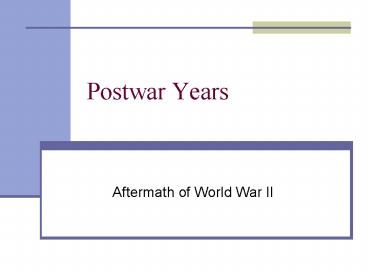Postwar Years - PowerPoint PPT Presentation
1 / 23
Title:
Postwar Years
Description:
Nazi party must be disbanded. Politics must be rebuilt democratically ... French, British, American, and Soviet each controlled a zone, but disagreed on ... – PowerPoint PPT presentation
Number of Views:76
Avg rating:3.0/5.0
Title: Postwar Years
1
Postwar Years
- Aftermath of World War II
2
Occupation of Germany
- Germany must be demilitarized
- Nazi party must be disbanded
- Politics must be rebuilt democratically
- Those responsible for war atrocities should be
brought to trial - Allies split Germany into 4 zones
- French, British, American, and Soviet each
controlled a zone, but disagreed on postwar
plans for Germany
3
(No Transcript)
4
Postwar Germany
- The British and Americans felt that German
industries must be rebuilt to bring economic
revival - The French felt the Germany should remain
economically weak to prevent rearmament - The Soviets were focused on receiving 10
billion in reparations obviously wouldnt
help the economy recover - Eventually, they began running their zones
independently due to failures to reach
agreements
5
Nuremburg Trials
- Hitler was dead and many Nazi leaders escaped
- 22 high ranking Nazi leaders were charged with
crimes against peace and humanity - 12 sentenced to death
- 7 to life imprisonment
- 3 were acquitted
- Started a movement of denazification
- Removing Nazis from leadership roles in Germany
6
(No Transcript)
7
United Nations (currently 192 nations)
- Replaced the League of Nations
- Purposes
- Maintain international peace and security
- To act as a deterrent to aggressors
- To foster cooperation to solve social and
economic problems in the world
8
The Security Council
- Part of the UN
- To act as a mediator in international disputes
- US, UK, France, Soviet Union (Russia), and China
all have permanent members - Each have a veto power to cancel an action taken
by the council - Also consists of 10 temporary members from the
General Assembly
9
The General Assembly
- Consists of representatives of all UN nations
- Each hold equal voting power
- Responsible for drawing up UN financial budget
and elect judges in the international courts
10
Truman Doctrine
- The continued spread of communism was a threat
to democracy - The US must support free people who resist
communist takeover, but would not stamp out
communism in nations who choose it or where it
already existed - Policy of Containment
- Immediately provided assistance to Greece and
Turkey
11
Marshall Plan
- Western leaders thought that the Soviets wanted
to keep western nations weak so they would turn
to communist leaders - The US decided to offer assistance to European
nations on certain terms - Must break down trade barriers to allow goods to
flow freely - 1948-1952 13 billion spent
- Industrial and Agricultural production had
improved
12
Cominform
- Organization including all European communist
groups - Purpose was to oppose Marshall Plan aid
- Thought that the US was trying to dominate Europe
economically - Tightened Soviet control over central and
eastern Europe
13
Berlin Blockade
- The Soviets blockaded Berlin from Western
Germany in response to Western Germany becoming
unified - Western Berlin started running out of supplies
and food - The US and UK quickly organized an airlift
- Would send supplies that would benefit citizens
and factories
14
Berlin Blockade
- US also set up bombers in Britain in preparation
for war - The Soviets never stopped the airlift, and
eventually lifted the blockade
15
(No Transcript)
16
(No Transcript)
17
NATO
- The North Atlantic Treaty Organization
- Mutual defense pact
- If one member was attacked, all members would
unite against the attacker - Relied on US developed nuclear weapons to act as
a deterrent for Soviet invasion
18
Warsaw Pact
- In response to NATO, the Soviet Union
established a unified alliance of its own. - 20 year mutual defense agreement
- Did not rely as much on nuclear armament
- The communists had more ground troops than what
NATO could supply - Increased NATOs reliance on nuclear weapons
19
Great Britain After the War
- The UK was weak after the war
- Loss of lives
- Extreme costs and debts
- Industry was weakened due to bombings
- Started to adopt minor socialist policies
- Railroads, coal mines, and banks became
nationalized government controlled - Free medical care and other welfare programs for
its citizens
20
Great Britain After the War
- Unions were fighting for higher wages
- Worker productivity did not increase
- The prices of British goods rose and were no
longer competitive - Started to import more goods than they exported
- Similar to trade issues between U.S. and China
21
New Republics in France
- Adopted a new constitution
- Economy suffered severe damage during the war
- Received help from the Marshall Plan
- Also tried to re-establish overseas colonies
- 1950s costly wars in Indochina and Northern
Africa - Distrusted British and American influence in
Europe withdrew from NATO and developed their
own nuclear program - 1960s and 1970s series protests calling for
reform led to violent riots and civil unrest
22
Soviet Union After Stalin
- Communist leader of Ukraine took over
- Nikita Khrushchev
- Denounced Stalins leadership murderer and
criminal - Destalinization reversing Stalins policies
- Increased freedoms of speech and press
- Reduced use of secret police
- Loosened governments grip on business
- Continued strong military spending
23
Soviet Union After Stalin
- Developed space technology
- First orbiting satellite Sputnik 1957
- Became leading producer of coal, steel, cotton,
natural gas, and oil by the 1970s - Soviet and American relations worsened
- American spy plane shot down over Soviet Union
1960 - Berlin Wall built in 1961
- Cuban problems in 1962 (missile crisis)
- Starting in the end of the 1960s, communism
started to lose support































